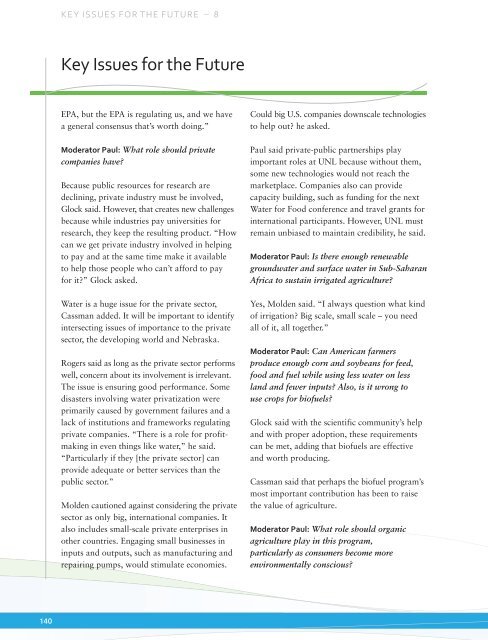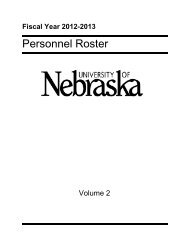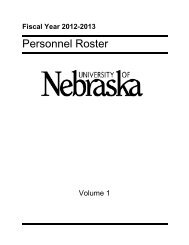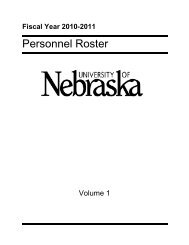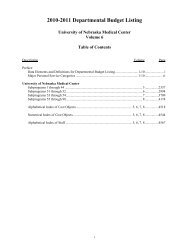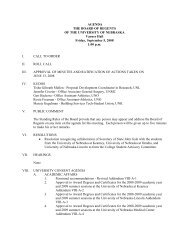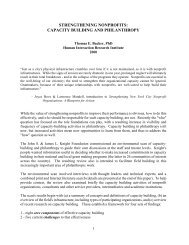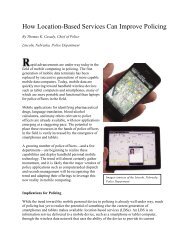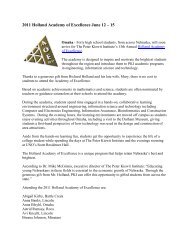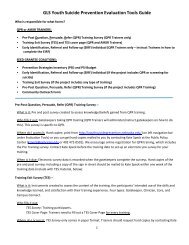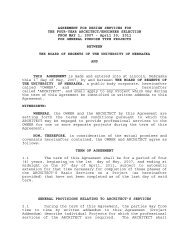Full Version - Water for Food Institute - University of Nebraska
Full Version - Water for Food Institute - University of Nebraska
Full Version - Water for Food Institute - University of Nebraska
Create successful ePaper yourself
Turn your PDF publications into a flip-book with our unique Google optimized e-Paper software.
140<br />
KEY ISSUES FOR THE FUTURE 8<br />
Key Issues <strong>for</strong> the Future<br />
EPA, but the EPA is regulating us, and we have<br />
a general consensus that’s worth doing.”<br />
Moderator Paul: What role should private<br />
companies have?<br />
Because public resources <strong>for</strong> research are<br />
declining, private industry must be involved,<br />
Glock said. However, that creates new challenges<br />
because while industries pay universities <strong>for</strong><br />
research, they keep the resulting product. “How<br />
can we get private industry involved in helping<br />
to pay and at the same time make it available<br />
to help those people who can’t af<strong>for</strong>d to pay<br />
<strong>for</strong> it?” Glock asked.<br />
<strong>Water</strong> is a huge issue <strong>for</strong> the private sector,<br />
Cassman added. It will be important to identify<br />
intersecting issues <strong>of</strong> importance to the private<br />
sector, the developing world and <strong>Nebraska</strong>.<br />
Rogers said as long as the private sector per<strong>for</strong>ms<br />
well, concern about its involvement is irrelevant.<br />
The issue is ensuring good per<strong>for</strong>mance. Some<br />
disasters involving water privatization were<br />
primarily caused by government failures and a<br />
lack <strong>of</strong> institutions and frameworks regulating<br />
private companies. “There is a role <strong>for</strong> pr<strong>of</strong>itmaking<br />
in even things like water,” he said.<br />
“Particularly if they [the private sector] can<br />
provide adequate or better services than the<br />
public sector.”<br />
Molden cautioned against considering the private<br />
sector as only big, international companies. It<br />
also includes small-scale private enterprises in<br />
other countries. Engaging small businesses in<br />
inputs and outputs, such as manufacturing and<br />
repairing pumps, would stimulate economies.<br />
Could big U.S. companies downscale technologies<br />
to help out? he asked.<br />
Paul said private-public partnerships play<br />
important roles at UNL because without them,<br />
some new technologies would not reach the<br />
marketplace. Companies also can provide<br />
capacity building, such as funding <strong>for</strong> the next<br />
<strong>Water</strong> <strong>for</strong> <strong>Food</strong> conference and travel grants <strong>for</strong><br />
international participants. However, UNL must<br />
remain unbiased to maintain credibility, he said.<br />
Moderator Paul: Is there enough renewable<br />
groundwater and surface water in Sub-Saharan<br />
Africa to sustain irrigated agriculture?<br />
Yes, Molden said. “I always question what kind<br />
<strong>of</strong> irrigation? Big scale, small scale – you need<br />
all <strong>of</strong> it, all together.”<br />
Moderator Paul: Can American farmers<br />
produce enough corn and soybeans <strong>for</strong> feed,<br />
food and fuel while using less water on less<br />
land and fewer inputs? Also, is it wrong to<br />
use crops <strong>for</strong> bi<strong>of</strong>uels?<br />
Glock said with the scientific community’s help<br />
and with proper adoption, these requirements<br />
can be met, adding that bi<strong>of</strong>uels are effective<br />
and worth producing.<br />
Cassman said that perhaps the bi<strong>of</strong>uel program’s<br />
most important contribution has been to raise<br />
the value <strong>of</strong> agriculture.<br />
Moderator Paul: What role should organic<br />
agriculture play in this program,<br />
particularly as consumers become more<br />
environmentally conscious?


